Ace Frehley invites us to his home to talk tone tricks, 10,000 Volts and pawn shop treasures
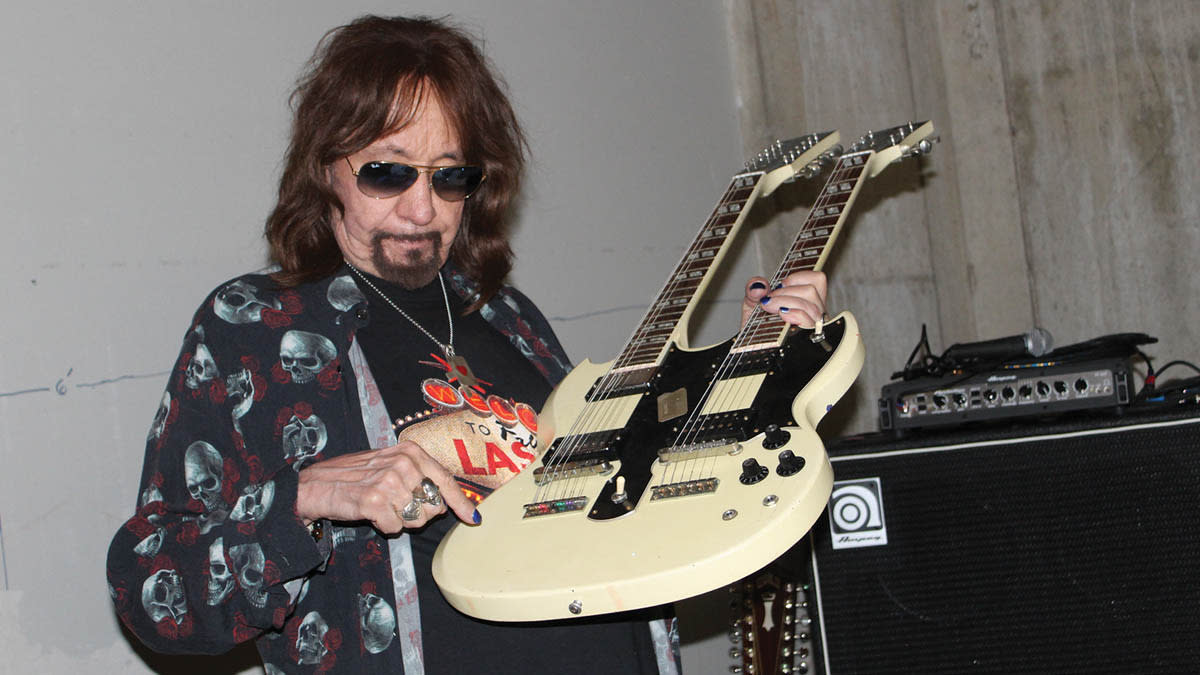
- Oops!Something went wrong.Please try again later.
In an affluent New Jersey suburb about an hour’s drive from Manhattan, a maze of tree-lined side streets creates a grid that keeps out the heavy traffic, leaving a peaceful, bucolic neighborhood lined with spacious homes and lush, manicured lawns undisturbed by the noise. At the end of a short block that resembles most of the other streets is a Colonial-style home that’s a bit larger than the surrounding residences.
The biggest clue that there’s something different here is the long, curved driveway that runs past rows of privacy trees and seems to disappear. At the end of the driveway there’s a parking area big enough for a dozen cars; on the other side is the front of the stately yet inviting home of Ace Frehley.
The guitar hero and co-founder of Kiss warmly greets Guitar World at the door and invites us into the kitchen for a cup of coffee and a brief chat about world events before leading us on a guided tour of the home and basement studio, where he wrote and recorded much of his new album, 10,000 Volts. When asked why he’s living in upper-class suburbia instead of a major rock mecca, Frehley shrugs.
“We got this place for a great price, and I really like it out here,” he says, adjusting his large, rounded sunglasses with his blue nail-polished fingers. “People around here are all successful, and they’re not really into the whole world of rock ’n’ roll. I can go out to dinner and eat in peace without being bothered.”
Chez Frehley may not be located in a rock haven, but the inside is designed to appeal to the rock star aesthetic Frehley has followed ever since his dad gave him his first guitar at age 13; Frehley’s early obsession with rock ’n’ roll – and his fascination with science fiction – led to his entry into Kiss in 1973, and his band character, Space Ace.
To wit, old science-fiction movie posters line the walls of his home, and every creature (feature) comfort is present: an antique pool table, a spaceship portal painted on a wall behind a velvety blue couch, even a fan-crafted poster of Ace replacing Jack Nicholson in the famous final scene black-and-white wall photo in The Shining.
There’s also the more cozy, homey stuff, including a giant-screen TV with high-end speakers, a living room with comfy modern furniture and framed pictures of family and friends.
Of course, there’s no shortage of Kiss and Ace memorabilia, and in a room behind the kitchen is a display of unique guitars Ace loves but doesn’t play, including a goldtop Gibson ES-335, a glittery flame-colored Strat and an oddity that Frehley can’t identify. It’s a brown Telecaster-shaped “NDEA Magnetic” with two P90 pickups and four tone knobs inlaid with marble blue-green stones.
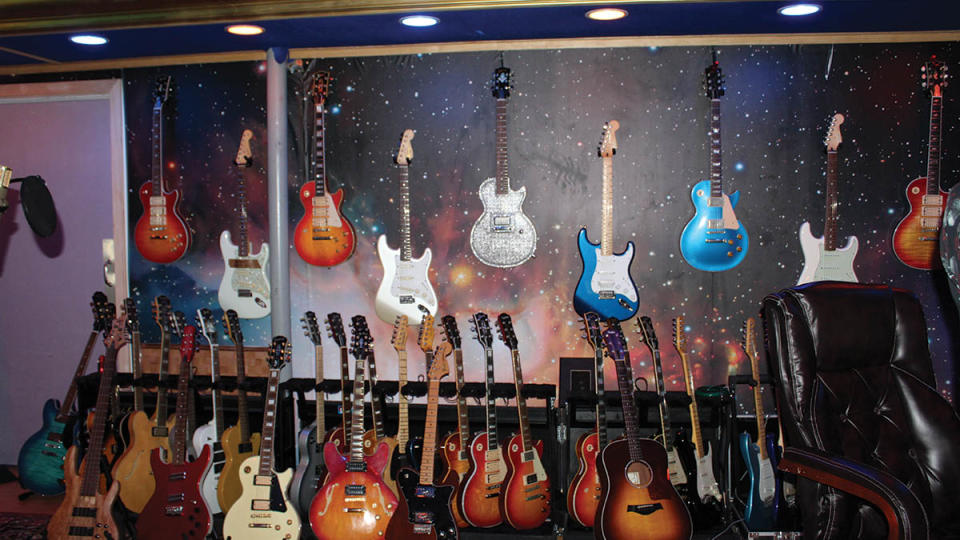
“I’ve never seen anything like it before,” Ace says, “So I had to have it. Maybe one of your readers can tell me what it is.”
A little more shop talk follows before Ace heads over to the picture windows overlooking his backyard and points to the spacious jacuzzi, where he relaxes in the spring and summer.
Not only is it meditative, but the warm water and pressurized jets help soothe his back and neck, which he injured in multiple car accidents in the Seventies and Eighties. But that was a lifetime ago, when he seemed to be living on borrowed time and was partying so hard he could no longer function in the band he helped form.
Now, 17 years clean and sober, Ace is in fine shape, making new music, touring with his band – featuring guitarist Jeremy Asbrock, bassist Ryan Cook and drummer Scott Coogan – and recording cover albums of his favorite old songs.
Inspired, creatively motivated and energized, he enjoys spending his leisure time with his fiancée Lara Cove, playing with his giant poodle Chewie and taking frequent trips to Las Vegas to gamble.
Despite the decades of aches and pains, Ace gets around pretty well for a guy who’ll turn 73 on April 27. And he’s convinced he’s got many years of songwriting and recording ahead of him.
“I’ve got really good genes in my family,” he says. “My aunt was 99 when she died. My dad lived to be 96 and my mother lived to be 86. She would’ve lived a lot longer if my father didn’t pass away; she died of a broken heart not long after.
I’ve always loved collecting guitars. In Kiss, when we pulled into a new city, instead of checking into the hotel, me and my guitar tech would drive around to all the local pawn shops.
“It was Super Bowl weekend. I spent a couple days with her in the hospital and I said to her, ‘It’s okay, you can let go now. You can go up to heaven and be with Pop.’ She died 12 hours later.”
While he’s convinced he has many productive years left to rock the house, he doesn’t want to settle into old age without kicking, screaming and ripping on guitar. That’s one reason he spent a considerable amount of time and money to renovate his basement into the fully functioning Ace in the Hole studios, which includes a fully furnished rehearsal stage.
Across the hall from the practice area is a door with a metal sign that reads: “AREA 51: WARNING – RESTRICTED AREA – Use of deadly force authorized – NO TRESPASSING.”
Inside is the nerve center of the compound, the high-tech studio and vocal room where Frehley wrote and recorded much of 10,000 Volts with engineer, songwriter and multi-instrumentalist Steve Brown of ’80s hair metal band Trixter. The duo also recorded at Brown’s New Jersey studio, Mojo Vegas 6160.
Many of the guitars Ace used on 10,000 Volts, as well as some of his most prized acquisitions (including a white Les Paul decorated with tiny lightbulbs that make patterns in the dark) hang on the wall within easy reach.
“I’ve always loved collecting guitars,” he says. “In Kiss, when we pulled into a new city, instead of checking into the hotel, me and my guitar tech would drive around to all the local pawn shops. We got some great stuff that way.”
Ace still sometimes combs pawn shops, but he also buys from modern retailers, including Reverb.com. He holds up a gorgeous blue Les Paul.
“I got it about six months ago on Reverb for $2,000,” he says. “I don’t know who made it; I don’t even know who painted it because that’s not a stock Gibson. But it’s one of the best-playing Les Pauls I own, and I’m probably going to take it on tour with me when we go out again in 2024.”
Though the title track for 10,000 Volts wasn’t the last song Frehley recorded, it was the first single he released, and the scribbly, original handwritten lyrics rest on a music stand near the chair of his control desk.
Since he released the video for the title track on November 28, 2023, 10,000 Volts has received close to a million streams on YouTube. The bluesy, rib-kicking anthem is quintessential Ace, combining the visceral clout of Mission to Mars and the classic melodicism of Ace’s Shock Me, from the 1977 Kiss album Love Gun.
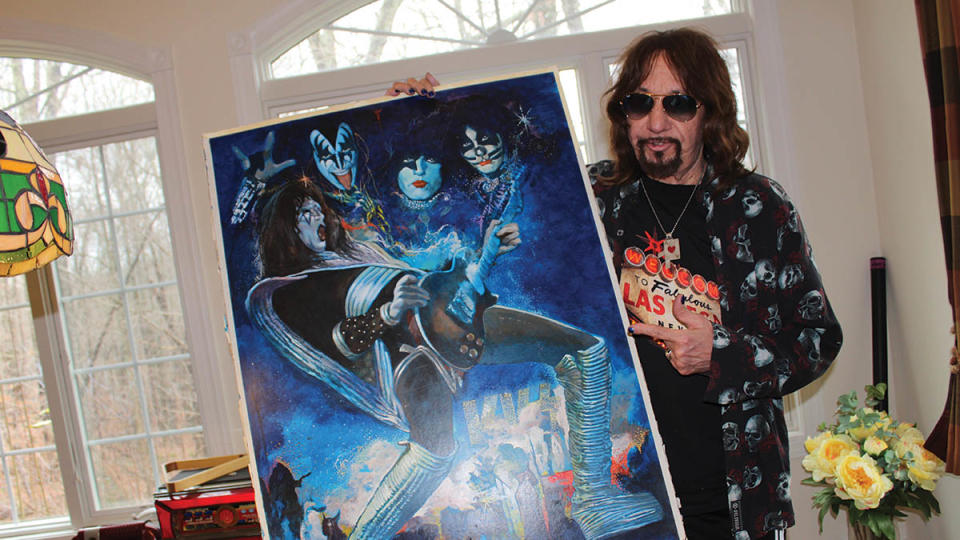
“It’s funny because I wrote both songs, Shock Me and 10,000 Volts about being electrocuted onstage during a Kiss show in Lakeland, Florida,” Ace says, “I still love Shock Me, but I might like 10,000 Volts even better. It’s just this kick-ass rock ’n’ roll song that’s really fun to play.”
In addition to being a master of choice pentatonic leads, Frehley remains a theatrical performer, as evidenced by the lightning bolt and pyro-enhanced performance video for 10,000 Volts. Just don’t expect future Ace shows to feature the kind of fireworks-blasting headstocks he played in Kiss.
“I don’t have any of those guitars around anymore,” he says. “People kept offering me ridiculous amounts of money for them, so I sold them. But I still have the blueprints.”
Speaking of Kiss, it would be remiss not to mention the recent kerfuffle that went down right before the band’s (possibly) final tour. When Gene Simmons and Paul Stanley announced that Kiss would play their last-ever concert at Madison Square Garden, they talked about inviting Ace and drummer Peter Criss to take the stage with them.
Word got out, and Frehley started looking forward to the opportunity to perform with his old bandmates for the first time since February 24, 2002, during the closing ceremony of the Winter Olympics. Then he heard Stanley talking smack about him and insulting his playing.
“The thing is, when they first talked about us playing with them, they never really meant it, they just wanted to sell more tickets,” Frehley says with a hint of annoyance.
“And it all fell apart when they went on the Howard Stern Show and said that if they played with me and Peter, then they might as well change the band’s name to Piss. But that’s the way they are.
“And as far as I’m concerned, they did what they did, and I’m happy doing what I’m doing. I’m still going strong, and I’ve just done one of the best albums of my career.”
As far as I’m concerned, they did what they did, and I’m happy doing what I’m doing. I’m still going strong, and I’ve just done one of the best albums of my career
Frehley started writing songs for 10,000 Volts back in 2022 with his childhood friend, Peppy Castro, who played guitar in the Sixties psychedelic garage band Blues Magoos, and guitarist Derrek Hawkins, who toured with Ace in 2007. But Frehley wasn’t excited with anything they wrote.
When he shared his frustrations with his fiancée, she suggested Ace do some writing with her friend Steve Brown, who has worked with Def Leppard, Dennis DeYoung, Danger Danger and the Broadway musical Rock of Ages.
“I knew him on a casual level back in the day,” Ace says. “Steve was a big fan, and, like a lot of guitarists, he said seeing me in Kiss was one of the things that inspired him to play, which is really flattering.
“Fast-forward a bunch of years, and now he’s a really talented songwriter and engineer who has worked with all these great people on all kinds of music. I figured, why not give it a shot? So I gave him a call.”
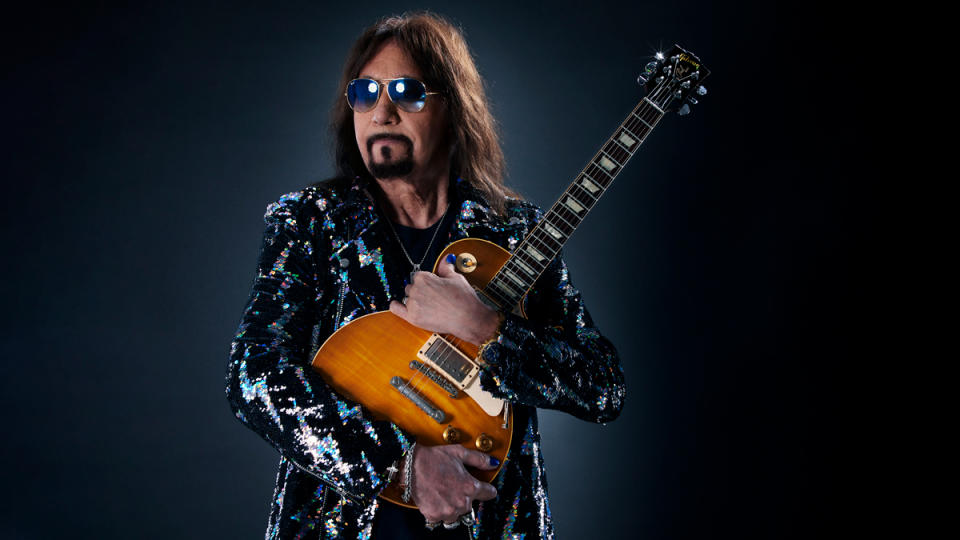
Brown sent Frehley a professional demo of a swaggering, mid-paced, blues-based anthem full of sustained, electrified chords. Impressed, and noting that the song contained a line about “walking on the moon” – an excellent move when writing for a Spaceman – Ace called Brown and told him he liked the track but wanted to rework the lyrics and change the title to Walking on the Moon. And there was one other change he wanted to make.
“I said, ‘Steve, this needs a bridge.’ He goes, ‘What do you mean it needs a bridge?’ I go, ‘It’s great – but it needs a bridge.’ He came over, we rewrote the lyrics, I put the bridge in, and the song was finished. No drama. We did the whole thing in a day. And the chemistry was so good, we just kept going.”
Over most of 2023, whenever Frehley and Brown could line up their schedules, they got together at one of their home studios to work on new songs (about 25 times in total), and the chemistry was always kinetic. During one six-day session, the two wrote five songs.
By October, 13 months after Frehley began the project, the two were tweaking the final mixes of 10,000 Volts. Catchier and more cohesive than 2018’s Spaceman, the album includes the heartrending piano-enhanced ballad “Life of a Stranger,” the chuggy, propulsive Cosmic Heart, the scorching title track and the infectious pop-metal riff-fests of Cherry Medicine and Blinded.
Depending on the vibe of the track he worked on, Ace chose from a variety of Gibsons and sometimes a couple of Fender Stratocasters, plugged them into a Marshall JCM800 and let fly, using only his bridge pickup (he’s disconnected the others).
Buoyed by enthusiasm for the new songs and some real-life family and career drama he’d rather not talk about, Frehley injected both joy and frustration into his playing. And he recorded the solos impulsively and spontaneously, playing from the heart instead of planning out the progressions.
In addition to being excited to share his first batch of originals since Spaceman, he’s eager to turn the tables on anyone who thought he wasn’t good enough to play onstage with Kiss and demonstrate that he’s as capable of releasing great songs as he was in 1978 and is firmly back in the groove.
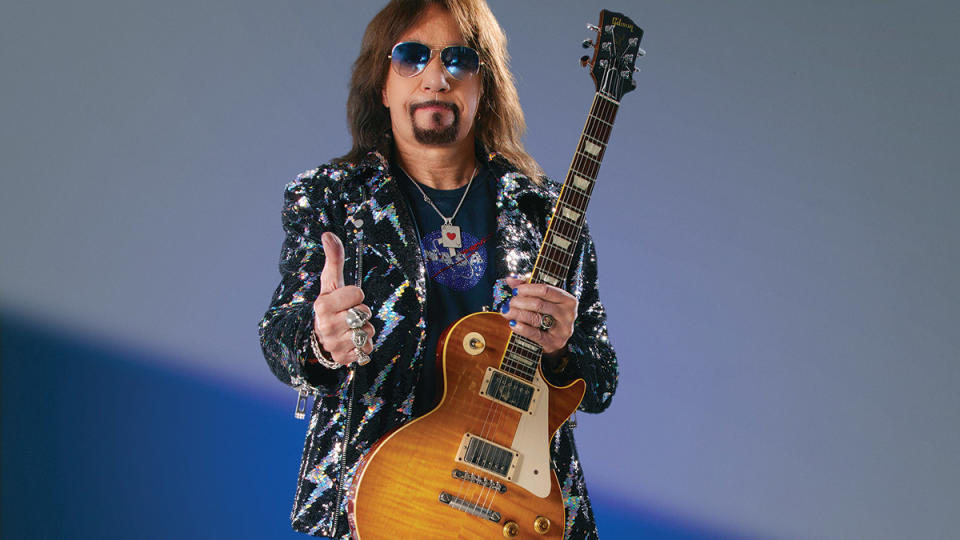
Your last two records were covers albums. Why did you want to release a record of originals?
“I looked at my contract and it said there was still a record I owed them, so I didn’t have a choice. I didn’t want them knocking on my door or canceling my contract. [Laughs] No, I was slated to do a studio record with original songs, and the timing was good. I figured I’d do another Origins [covers album] after that. The only cover on this one is Life of a Stranger, which is by Nadia and was used over the credits of the first Transporter movie with Jason Statham.”
I always try to think out of the box. It’s just a matter of brainstorming and coming up with new ideas
Why did you want to cover a Latin-tinged electro-pop song that was released in 2002?
“I just liked the song. She does it, like, real sparse pop techno. I wanted to do it with heavy drums, rippin’ guitars and a really big chorus. It’s something different for me. I always try to think out of the box. It’s just a matter of brainstorming and coming up with new ideas.”
How did you want 10,000 Volts to be an evolution from Spaceman?
“I wanted it to be a little more current. It was great working with Steve because he’s in his fifties, so he’s got a different perspective than I do, and he’s been using ProTools for 30 years. I’m really happy with everything about the record, and the production is way better that a lot of my other stuff.”
Did you and Steve write most of the songs over the past year?
“We worked really quickly. The only old song is Back in My Arms Again, which I wrote 40 years ago with Arthur Stead [keyboardist for Frehley’s Comet in 1984 and 1985].”
A lot of tried-and-true Ace Frehley fans have heard your old demos and have wondered why you didn’t release that song earlier. The mid-tempo mood and yearning vocals have ‘80s rock radio hit’ written all over it.
“I don’t know why I didn’t do something with it. I really love it. But I’ve got so many songs I’ve written but haven’t recorded, so it’s not that strange. Plus, I was caught up with lots of other things. It just seemed like the song would work really well on 10,000 Volts, and Steve agreed.”
I don’t like having a lot of people in the control room when I’m recording. I learned that when I was doing my ’78 solo album. There was me, Eddie Kramer, Anton Fig and that was it
Once you had the songs written, did you and Steve record them together with other musicians?
“The thing about the studio is, when you find the right path with the right team, there’s a very relaxed feel. And part of that comes from having as few people in there with you as possible. I don’t like having a lot of people in the control room when I’m recording. I learned that when I was doing my ’78 solo album.
“There was me, Eddie Kramer, Anton Fig and that was it. I get distracted when there are three or four other people in there and everybody has an opinion, just like everybody has an asshole. It’s just too much.”
Do you feel less confident?
“It’s not that. See, I know what I want, right? I know what I’m looking for. And if we’re not on the same page, shut your mouth. ‘Hey, fuck you. It’s my record.’ Steve totally got that, and he understood it. We agreed on stuff 95 percent of the time, anyway, so there really wasn’t any arguing. And he was always open to changing things to make them better. We both did whatever we could to make the songs as good as they could be.”
What Kiss has done in the past doesn’t affect me at all
When you write and record solo material, do you try to play differently than you did in Kiss?
“I don’t even think about Kiss when I write. It’s my solo record and I just write the way I write and don’t try to emulate anything. When I’m writing a song, I never think, ‘Oh, how would Kiss fans relate to this?’ There are Ace fans, and, of course, a lot of Kiss fans enjoy my music, which is nice. But what Kiss has done in the past doesn’t affect me at all.”
Regardless of the vibe of the song, your guitar sound is instantly identifiable.
“You plug a Les Paul into a Marshall and turn it up to 10 and you’ve got the perfect marriage, and I’ve been using that combination for 40-plus years. It has never let me down. So, if it ain’t broke, don’t fix it. There’s one song I tried to do a little bit of a country feel on, and then I listened back to it and said, ‘No, it should be an Ace solo. I shouldn’t be trying to copy country artists.’ And I think the new solo worked out better.”

How important are Gibsons to your guitar sound?
“Those are the meat and potatoes, but sometimes you need another flavor. A lot of times, when I lay down a rhythm track, I’ll lay it down with a Les Paul, and then I’ll double it with a Fender because a Fender has a completely different harmonic range than a Les Paul. And when you blend them together, you get a much thicker sound. That’s a trick I learned from Pete Townshend, and I’ve been doing it forever.”
Steve played rhythm guitar and bass on almost every song. He also played solos on Walkin’ on the Moon and Fightin’ for Life. Isn’t that your turf?
“When Steve would write the music, a lot of the time he’d play a solo and say, ‘Ace, this is the kind of thing I think would work on this song.’ I’d record most of the solos, but a lot of his solos were really good.
“So, a couple times I said to him, 'Steve, this solo you did is so good, let’s just use it,' because I don’t know if I could have improved upon it. And if he did a great solo he deserved credit. I give credit where credit is due.”
You’ve spoken before about being completely self-taught and learning by feeling around for what works. But that’s not exactly true. You seem to have learned a lot from carefully listening to the players you’ve admired and incorporating some of what they do into your style.
“That’s true. I’ve learned from a lot of guys who sound like no one else. When you hear Eric Clapton play, you know it’s Clapton. Jimi Hendrix had his own style as well, and it was very distinctive; Townshend is the same way. He’s the master of chord work. Townshend could play the same chord in a dozen different positions.
“I learned a lot from studying Pete Townshend. A lot of people don’t know that he buried an acoustic guitar under the electric guitar to create a fuller sound. I use that now on some songs. You don’t really hear it that much, but if you pull it out, you miss it because it helps support the song. And he’s the one that really inspired me to mess around with the toggle switch.”
Kiss were a quintessential American band, yet you cut your chops on a lot of great British players, which is kind of ironic since the British Invasion bands rooted their sound in older American blues.
“I studied Clapton, Jeff Beck, Hendrix, Townshend, George Harrison, Keith Richards – the whole British Invasion – from the time I was 13 and my dad bought me my first electric guitar. There were a couple of American guitar players that influenced me, including Jim McCarty in the Detroit Wheels and Joe Walsh when he was in the James Gang. And I listened to B.B. King, Albert King and Freddie King.
“A lot of those Black blues guitarists had a way of playing that was just so unorthodox and simple, but great at the same time. Chuck Berry never played complicated solos. It was all about picking the note; it was the attitude and personality. And playing with attitude has so much to do with the way your guitar work comes out.”
Did you pre-write your solos for the new album?
“No, never. I just said, ‘Steve, hit the record button. What key is this in?’ And then, boom, I’d go off and play it in four or five passes. We’d listen back to ’em and piece the best parts together in ProTools. A few mouse clicks later, you’ve got a guitar solo.”
Do you tend to stay mostly within the pentatonic scale?
“Yeah, because that’s my style. It works. If it ain’t broke, don’t fix it. But at the same time, so much of what you do has to do with the way you pick the notes. You can play pinch harmonics, and bend the note, you can apply a lot of pressure with your pick or just a little. You can scrape the strings. There are all kinds of things you can do that have nothing to do with your fretting hand.”
So much of what you do has to do with the way you pick the notes. You can play pinch harmonics, and bend the note, you can apply a lot of pressure with your pick or just a little
10,000 Volts stands alone as a solid album, which keeps you sounding more relevant than a lot of artists who continue to tour off past hits and live off former glory – no names mentioned.
“It’s very rewarding to still be able to make records and have people want to listen to them. Just the reaction from the single 10,000 Volts is really heartwarming and that keeps me excited. I’m excited to see how the other singles do, and I’m looking forward to touring. I see only positive stuff in the future.
“Thank God, I have a beautiful woman that I’m engaged to and a wonderful family. Thank God everybody’s well. You can have a hundred million dollars in the bank, but if you don’t have your health, you don’t have anything.
“And with all that going for me, I can concentrate on music and continue to challenge myself and do different things. I want people to know it’s me when they hear me, but I don’t want to be doing the same old thing album after album.”
10,000 Volts is out now via Mnrk Heavy.

